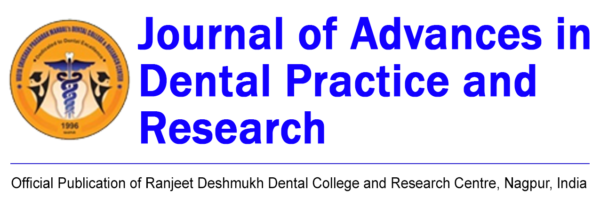Translate this page into:
Evaluation of undergraduate dental student’s willingness toward the treatment by dental student peers
*Corresponding author: Sachi Ganesh Chute, Department of Prosthodontics, VSPM Dental College Nagpur, Lata Mangeshkar Hospital, Nagpur, Maharashtra, India. sachichute700@gmail.com
-
Received: ,
Accepted: ,
How to cite this article: Chute SG, Pande N. Evaluation of undergraduate dental student’s willingness toward the treatment by dental student peers. J Adv Dental Pract Res 2022;1:46-50.
Abstract
Objectives:
In general, the patients reporting to dental clinics are more willing to take treatment advised by their dentists who are backed by scientific knowledge and experience. However, when it comes to dental students who are learning about diseases and various treatment modalities, practicing by themself, there comes a dubious situation whether to go for treatment by their dental peers or not. With this thought, this study was planned to evaluate the willingness of dental students toward the treatment by their dental peers. The aims of this study were to evaluate dental student’s willingness toward the treatment by dental student peers.
Materials and Methods:
In this cross-sectional study, undergraduate dental students and interns from VSPM DC RC, Nagpur, were evaluated, for which a self-administered questionnaire using Google forms was used.
Results:
The study revealed that only 32% of participants agreed to accept treatment by their dental peers. This finding suggests that students are uncertain to accept treatment by their peers.
Conclusion:
About 32% of participants were ready to accept treatment, this shows somehow satisfactory professional relation among students. High percentage of participants was not sure about the acceptance of treatment by their dental peer.
Keywords
Willingness
Dental peer
Acceptance
Dental treatment
INTRODUCTION
Clinical training is essential part of dental profession. During undergraduate training, dental students are posted to clinics. The clinical education mainly focuses on practice on patient, which include screening and check-ups or examination, taking radiographs, simple restorations, extractions, taking alginate impressions, oral prophylactic procedures, root canal treatment, as well as dental management of pediatrics patients. The dentist-patient relationship is the core of dentistry and it is a sensitive partnership, in which both sides have unique traits that might affect how services are delivered. Furthermore, the necessary factors are trust and confidence. The American Medical Association advises doctors to be aware that giving medical care to colleagues can pose special challenges in terms of neutrality, open communication, privacy and confidentiality, and informed consent.
Patients are said to place a high value on a dentist’s assessment of a treatment outcome. Treatment by peers has been a long part of dental education and it continues to be so and forms an important transition from pre-clinical to clinical dental training. Dental student’s acceptance of treatment by dental student peers is significant for stimulating future situation DPR, that is, strengthening patient care, building professional careers, opening the route for students to become independent dental practitioners, and reinforcing their confidence in treating community patients.[1]
With this background, the study was planned to evaluate the students who would accept treatment by dental student peers and explore factors associated with determining treatment by dental peers.[2,3]
MATERIALS AND METHODS
The study was approved by the Institutional Ethical Committee of the VSPM DCRC, Nagpur. This cross-sectional study was conducted among III and final BDS students and interns, willing to participate. A self-administered questionnaire was distributed among these 300 of participants to evaluate their willingness toward the treatment by their peers.
Study procedure
A pre-validated questionnaire was used. The study comprised demographic details such as participant’s age, gender, and year of study and the questionnaire comprised total 12 close-ended questions. The questionnaire was uploaded to online survey administration software, Google forms and was distributed through various social media (Whatsapp, Facebook, and Instagram) among the dental students and interns.
Statistical analysis
The information was mentioned in the Excel sheet. The collected data from the questionnaire were statistically analyzed.
RESULTS
The total 300 participants were evaluated, out of which 100 from each category i.e. interns, final and third BDS students were evaluated. 77% participants were female and 23% were male [Graph 1 and 2]. Among these, 94% have never been treated by dental student peer. Only 6% have been treated by their dental student peer. High percentage of participants was not sure about the acceptance of treatment. About 32% of participants were willing to accept the treatment. This shows the resistance of students toward the treatment [Graphs 3 and 4].[4]

- Gender graph of participants.
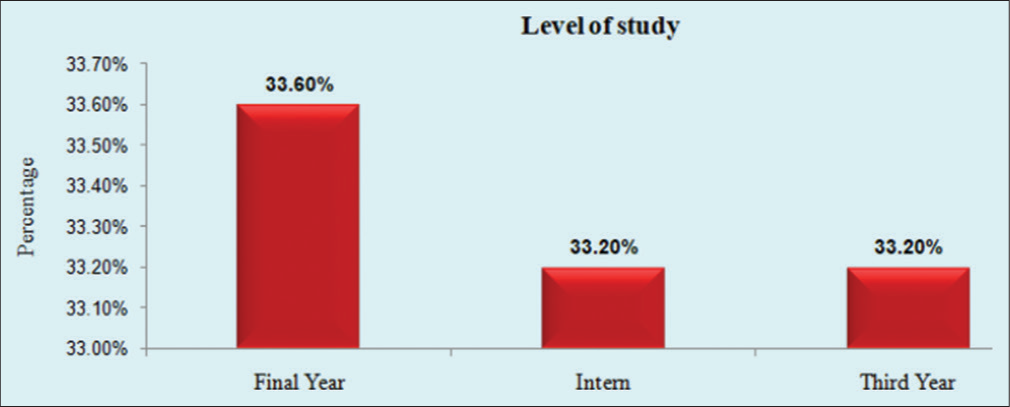
- Level of Study of participants.
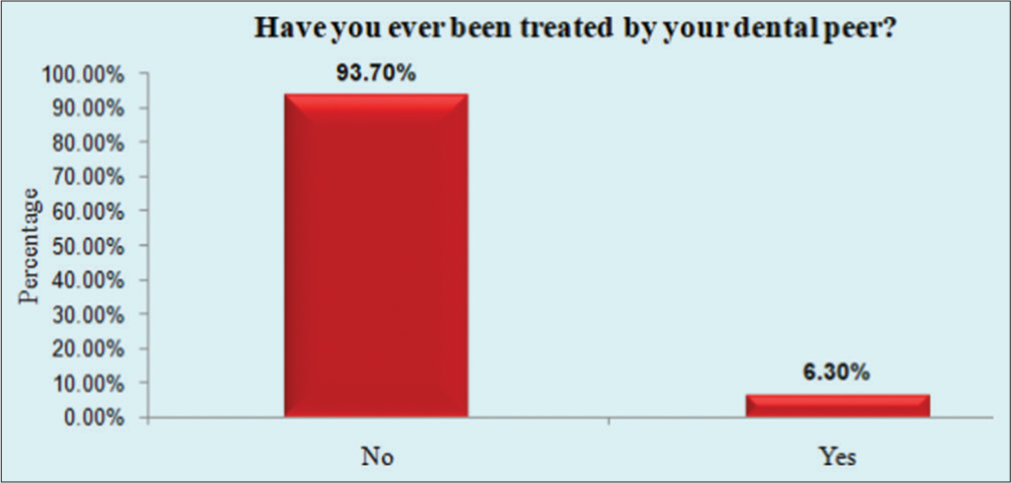
- Graph showing participants treated by their peer.
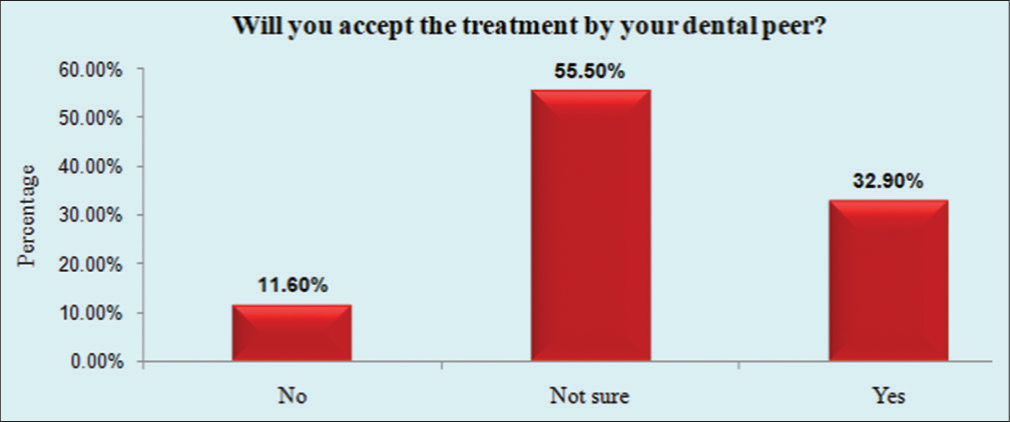
- Graph showing acceptance of treatment by their peer.
In the criteria for accepting the treatment by dental student peers, 74% of participants have accepted the treatment based on clinical performance of students. About 17% of accepted based on the academic performance of students, whereas 8% accepted on their reviews from patients and only 2% accepted on the reputation of the institution [Graph 5].
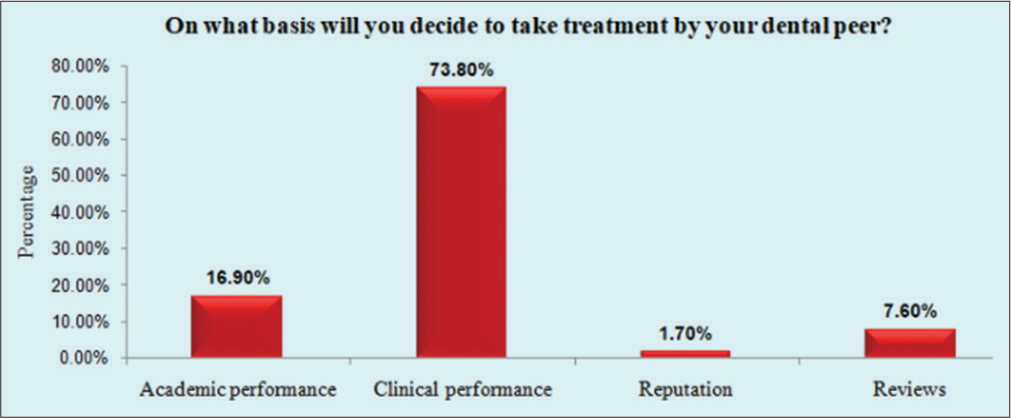
- Graph showing various factors for acceptance of treatment.
When evaluated regarding the factors influenced toward acceptance of treatment, 83% of participants felt that clinical performance of student influences acceptance of treatment. About 13% of participants believed that knowledge is one of the factors, whereas 4% believed that the trust is the influencing factor for the acceptance of treatment [Graph 6]. The reasons according to 51% of participants for accepting treatment were clinical performance. About 33% of participants had accepted it for the quality treatment, whereas 16% of participants accepted the treatment for the purpose of saving money and time [Graph 7].
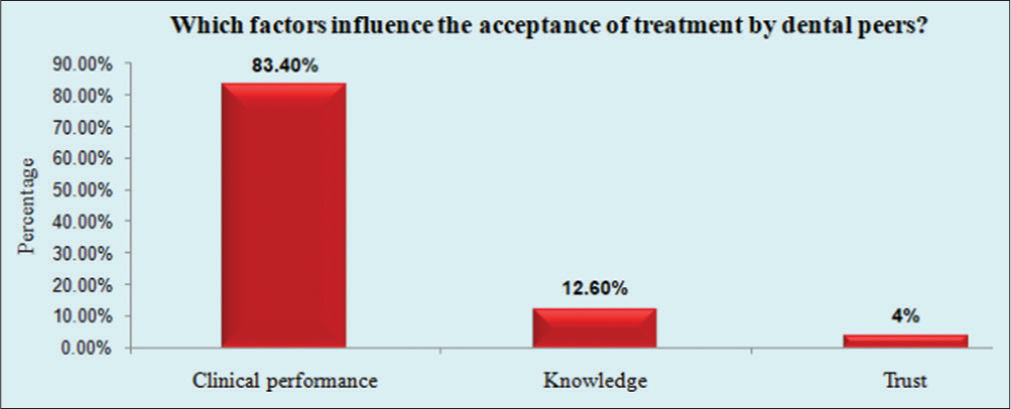
- Graph showing factors that influence treatment.
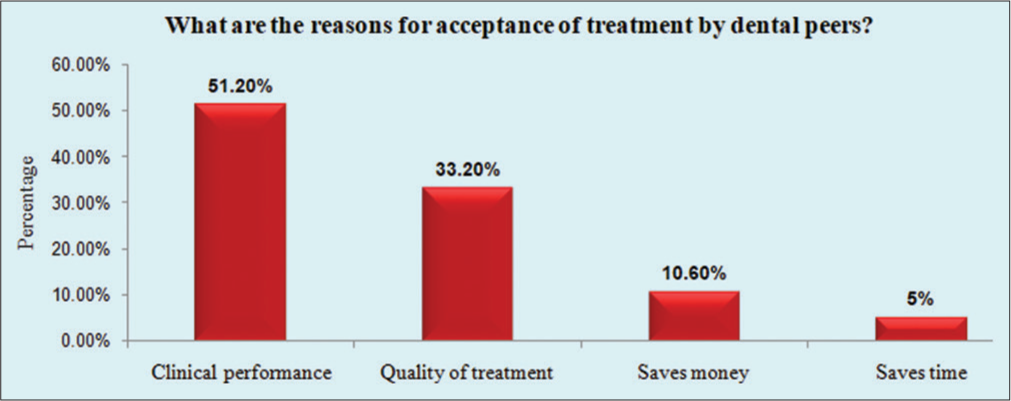
- Graph showing reasons for accepting treatment.
After evaluating the reasons for not accepting treatment, 51% of participants were having doubt of trust. About 26% of participants had some confidential reasons for not accepting treatment. About 22% of participants refused it for privacy issue, whereas 1.3% of participants were not comfortable [Graph 8]. About 48% of participants rated the confidence in their peer between 60% and 80%. About 44% rated between 40% and 60%. About 4% rated between 20% and 40%. About 2.30% rated between 80% and 100% [Graph 9].[5]
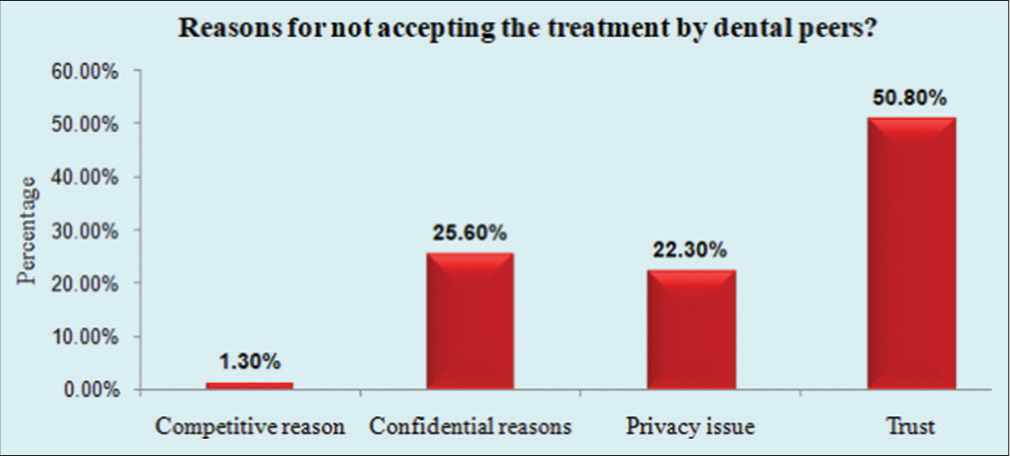
- Graph showing reasons for not accepting treatment.
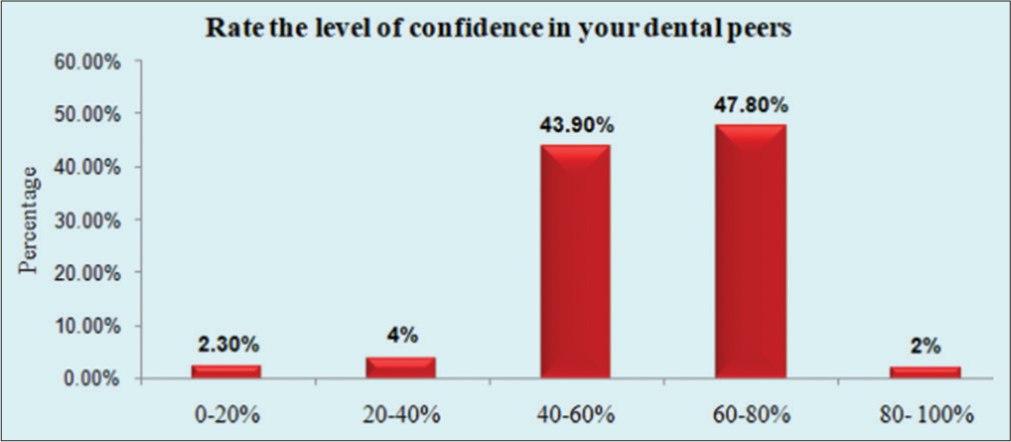
- Graph showing level of confidence amongst participants.
About 72% of participants thought that their dental peers could manage patients better. About 17% thought their peer could manage patients fairly and 12% of participant’s opinion was excellent patient management aspect with their dental peers [Graph 10].[4]
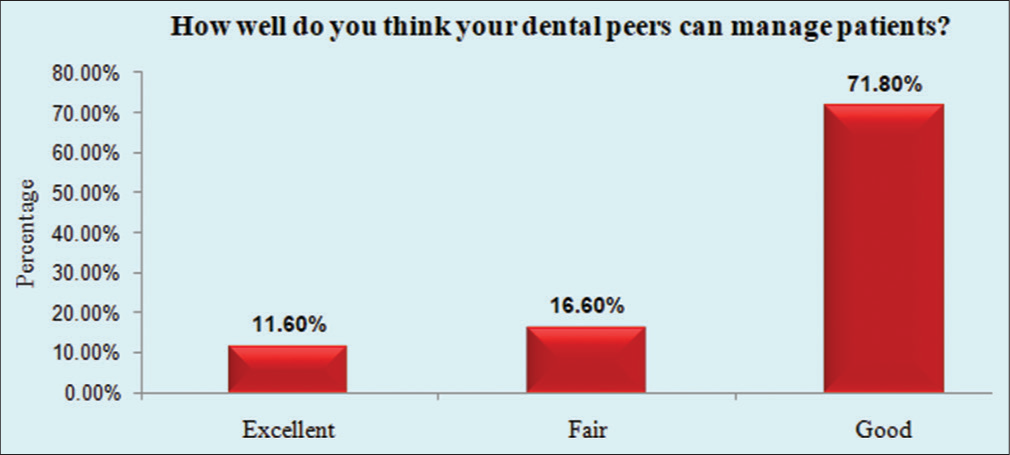
- Graph showing how well dental peers can manage their patients.
About 67% believed that their dental peers had better understanding of patient management. About 28% were not sure and 5% believed that their peers had comparatively less understanding of patient management [Graph 11].[4]
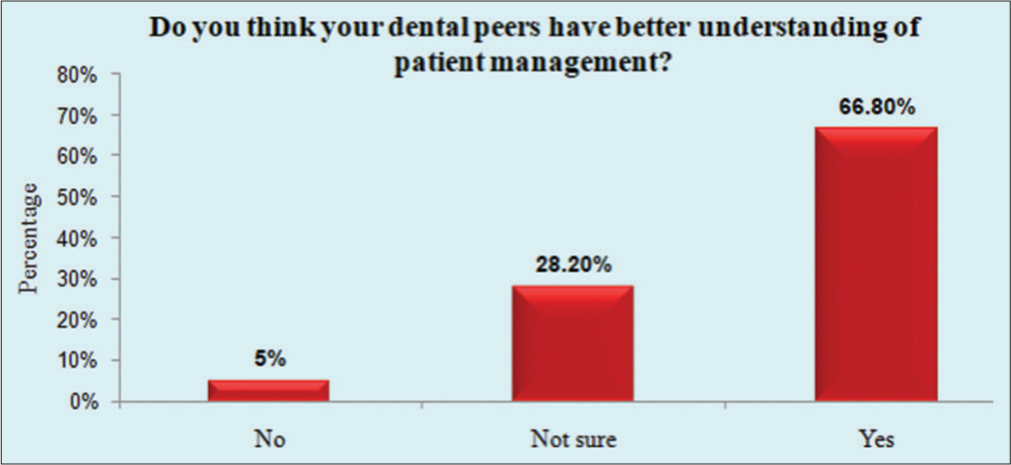
- Graph showing how well dental peers have better understanding of patient management.
About 71% of participants believed that the self-confidence and performance of the treatment are affected while treating colleagues. About 25% were not sure about this point. Only 4% thought that there is no change in the self-confidence and performance [Graph 12].[4]
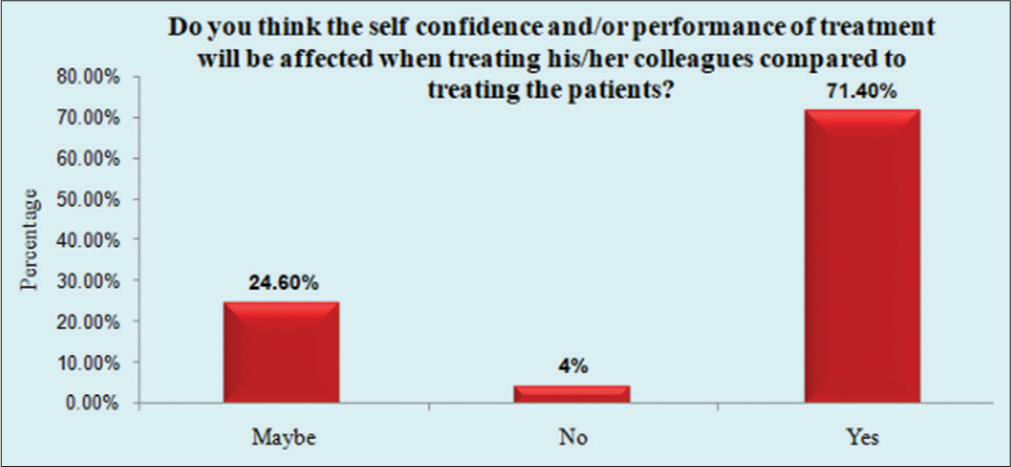
- Graph showing does the self confidence and/or performance of treatment will be affected when treating their colleague as compared to the patients.
DISCUSSION
The treatment provided by the health-care professional is considered successful based on the patient’s satisfaction toward treatment. Patients such as health-care workers are more aware and exposed toward the disease and the treatment options available for it, while, evaluating their treatment done by their peers, they focus on every minute detail of the outcome; therefore, this requires students to have trust toward their peers. Hence, there is need to evaluate the trust and confidence among students toward each other. This study was conducted among the undergraduate dental students from VSPM DCRC, Nagpur, to know the dental undergraduates willingness toward the acceptance of treatment by their dental peers this helps in knowing the dentist patient relation more and it also focuses on factors that influence the acceptance of treatment.
After data collection from questionnaire, statistical analysis, the results were obtained. The total number of participants were 300, of which 77% were female and 23% were male. Almost 33% were interns, final BDS and III year.
Students opted to be treated by a dental student peer were from all the academic years (III and final BDS and interns) who participated that 94% have never been treated by dental student peer. Only 6% have been treated by their dental student peer. These showed quite similar results with the study by Kassim et al., in which of 222 participating students 54% have been treated by their dental peer. About 18% have not been treated by their dental peer.[1]
Maximum percentage of participants was not sure about the acceptance of treatment. About 32% of participants are willing to accept the treatment, showing resistance of students toward the treatment.
The criteria for accepting the treatment by 74% of participants were based on clinical performance of students. About 17% of participants were based on the academic performance of students. About 8% based on the reviews from patients and 2% were ready to accept based on the reputation of the institution.
When asked about the factors which influence the acceptance of treatment, 83% of participants responded clinical performance of students is the one quality that determines their acceptance of treatment. About 13% of participants believed knowledge and 4% of participants believed trust influences the acceptance of treatment.
The reason according to 51% of participants for accepting treatment was clinical performance. For 33%, it was the for quality treatment. About 11% and 5% of participants accepted treatment as it would save money and time. In accordance to the other study of 222 participating reason for accepting the treatment among it, 85.5% were quality of treatment, 45% save time, 38% save time, and 29% get closer appointment.
The reason for not accepting treatment according to 50.8% of participants was trust. About 26% of participants had some confidential reasons for not accepting treatment. About 22% of participants refused to accept the treatment for privacy issue. Only 1.3% of participants felt not comfortable. In a study by Kassim et al. of 222 participating reason for not accepting the treatment among it, 53% were trust, 45% confidential reason, 22% personal reason, 14% privacy, and 4.5% competitive reason.[1]
About 48% of participants rated the confidence in their peer between 60% and 80%. About 44% rated between 40% and 60%. About 4% rated between 20% and 40%. About 2% rated between 0% and 20% and 2% rated between 80% and 100%. About 72% of participants thought that their dental peers could manage patients very well. About 17% thought their peer could manage patients moderately and 12% of participants thought that patient management was fantastic in their dental peers.
About 67% believed that their dental peers had better understanding of patient management. About 28% were not sure and 5% believed that their peers did not have better understanding of patient management.
About 71% of participants believed that self-confidence and performance of the treatment were affected when treated by their colleagues. About 25% were not sure. Only 4% thought that there was no change in the self-confidence and performance.
CONCLUSION
Patient dentist relation plays a very important role in treatment, this study is about the factors that influence the acceptance of treatment. About 32% of participants were ready to accept treatment, this shows the good professional relation among students. Maximum percentage of participants was not sure about the acceptance of treatment by their dental peer. This shows that students are hesitant in accepting treatment by their dental peers that this might be due to lack of practice and trust.
Limitations
Limited to one institution, therefore, it cannot be generalized to large population. Hence, more number of students from different colleges can be evaluated. The study is questionnaire based so answer may be biased.
Acknowledgments
The authors would like to thank the respected dean of the institution for permitting to conduct this study.
Declaration of patient consent
Patient’s consent not required as there are no patients in this study.
Conflicts of interest
There are no conflicts of interest.
Financial support and sponsorship
Nil.
References
- 'Undergraduate dental students' acceptance of treatment by dental student peers: A cross-sectional study. Patient Prefer Adherence. 2020;14:2035-42.
- [CrossRef] [PubMed] [Google Scholar]
- Acceptance to receive dental treatment performed by students: Comparison of two dental hospitals of Fukuoka Dental College. Int J Clin Prevent Dent. 2015;11:67-72.
- [CrossRef] [Google Scholar]
- Dental students' perceptions of dentist-patient interactions: An exploration of empathy in dental students. Strides Dev Med Educ. 2018;15:e65124.
- [CrossRef] [Google Scholar]
- Dentists' perceptions of their peer learning experiences in dental school and effects on practice. J Dent Educ. 2018;82:1185-93.
- [CrossRef] [PubMed] [Google Scholar]
- A randomized controlled trial of outreach placement's effect on dental students' clinical confidence. J Dent Educ. 2006;70:566-70.
- [CrossRef] [PubMed] [Google Scholar]
